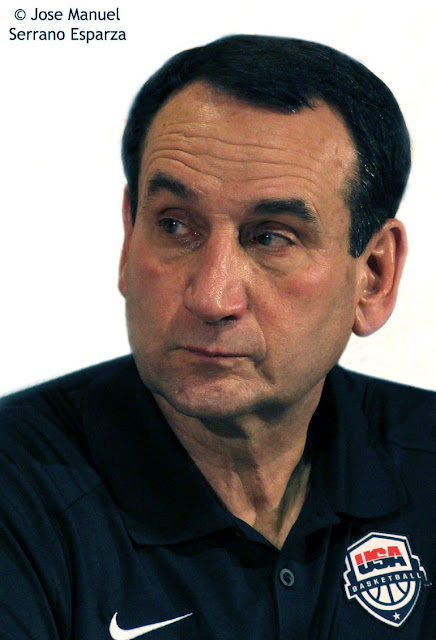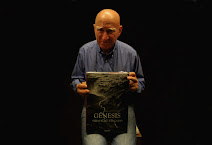lunes, 22 de agosto de 2016
MIKE KRZYZEWSKI: THE EMBODIMENT OF AMERICAN BASKETBALL
Two FIBA World Championships titles (Turkey 2010 and Spain 2014), three consecutive Olympic Games Golden Medals (Beijing 2008, London 2012 and Rio de Janeiro 2016), five Championships of the NCAA with Duke University (1991, 1992, 2001, 2010 and 2015), Naismith Memorial Basketball Hall of Fame Inducted in 2001 and 2010, College Basketball Hall of Fame Inducted in 2006, two times National Coach of the Year in the United States (1986 and 1997), three times Naismith College Coach of the Year (1989, 1992 and 1999).
This is the impressive background of Mike Krzyzewski, one of the best coaches in the History of United States Basketball, who after an 11 years stage since he was named head coach of the USA national basketball team in 2005, has just finished this period of his professional career with a golden brooch, beating Serbia 66-96 (a difference of nothing less than 30 points) in the final game of the Rio de Janeiro 2016 Olympic games basketball competition (with a stellar performance of Kevin Durant, who scored 30 points) and winning the golden medal, his third victory in a row after previously prevailing at Beijing 2008 and London 2012 Olympic Games basketball tournaments.
After playing at the United States Military Academy at West Point, between 1966 and 1969 under the famous coach Bobby Knight (his basketball teacher and the key person in his professional sporting activity), his coaching career began in the 1974-1975 season as assistant of Bobby Knight with the Indiana Hoosiers of the NCAA and in 1976 he came back to West Point as head coach of the Army Cadets, attaining a 73-59 record in five seasons.
And on March 18, 1980 Mike Krzyzewski was named head coach of Duke University, a post he has held for thirty-six years hitherto, having won five NCAA Championships (1991, 1992, 2001, 2010, 2015) and being currently the most winning active coach in men´s NCAA Tournament, with an 86-25 record with a .767 winning percentage, having won more than 1,000 NCAA games, the first coach to do that in the history of the NCAA.
He was also assistant coach to the USA teams who won gold medals at the 1984 Olympic Games (with Bobby Knight as head coach) and 1992 (with Chuck Daly as head coach) and after being named USA national head coach in 2005, he has won the aforementioned two FIBA World Championships in Turkey 2010 and Spain 2014 and three consecutive gold medals at the Beijing 2008, London 2012 and Rio de Janeiro 2016 Olympic Games.
Kryzewski´s basketball philosophy is based on some keystones:
- All the players of his teams can be decisive at any moment. This way each player feels to be an integral part of the line-up from scratch and does his utmost to win games, because Coach K is a master blending his men into a highly efficient unit.
- A focus on defense as a pivotal aspect of the game, from which being able to develop successful attacks. This defensive activity must be highly intensive, striving upon making fast breaks stealing the ball from rival players (with very fast movements of the hands) or starting them after capturing defensive rebounds. It will also be useful in specific stages of the games when the percentage of shots accuracy is not good, phases in which defense will be beefed up and the players will be able to physically endure it.
- A versatility in the tasks assigned to the members of the line-ups. For example, if there´s an USA player excelling in attack missions, he can be suddenly asked by Kryzewski to perform defense on the best rival player, and a top-notch American playguard extraordinary one on one through lightning dribbles, featuring a tremendous physical talent and leaping ability and able to do amazingly fast penetrations and even sometimes capture rebounds before much taller and stronger rival players, can be ordered to nail three-point jumpers by Coach K.
- To learn from the defeats, as happened in the 1986 NCAA Final Four, when Duke was favourite to win the title, having the All-American guard Johnny Dawkins and were 28-2 for the season, storming into the Final Four. Duke beat a tough Kansas team 71-67 in semifinals, with Dawkins scoring 24 points, but in the final game against Louisville (which had topped LSU 88-77 in semifinals), after having led the game 27-34 at the half, but the great performance of Louisville´s freshman six foot, nine-inch center Pervis Ellison (25 points and 11 rebounds) with his cool skills, well helped by the senior forward Billy Thompson and the senior guard Milt Wagner tipped the scales in favour of Louisville, which finally won the title 72-69.
© Text and Pictures: José Manuel Serrano Esparza








